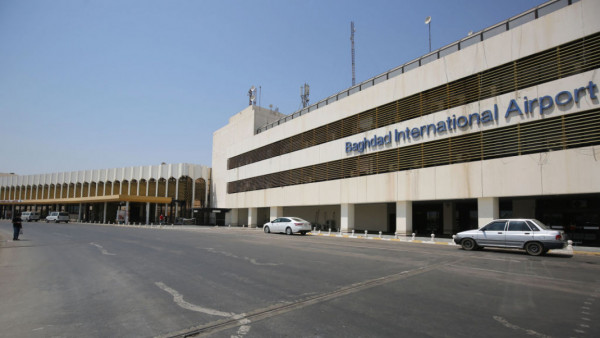The Interior Ministry in a statement confirmed that the officer responsible for security in the area has been detained. [Getty]
The Iraqi Ministry of Interior has launched an urgent investigation following an attack late on Monday night on a military base near Baghdad International Airport, which hosts US forces. At least two Katyusha rockets were fired at the base, and no casualties were reported. The incident, raising security concerns, comes in the wake of Hezbollah leader Hassan Nasrallah’s assassination, further increasing regional tensions.
The Interior Ministry in a statement confirmed that the officer responsible for security in the area has been detained. A full inquiry is underway to determine the causes of the security breach and to hold accountable any personnel found negligent.
Prime Minister Mohammed Shia’ Al-Sudani has ordered that results be delivered within 48 hours, Major General Yahya Rasul, the spokesperson for the Commander-in-Chief of the Iraqi Armed Forces, said in a separate statement.
The ministry emphasised its dedication to protecting public safety and ensuring that those involved in the attack will face justice.
In the strikes on the Victoria Military Base, located within Baghdad International Airport, one missile landed near the base, another hit the headquarters of the second battalion of Iraq’s Counter-Terrorism Service, and a third fell dangerously close to a civilian runway. Despite this, the Iraqi Ministry of Transportation has denied disruptions to civilian air traffic, confirming that operations continue as normal.
The attacks are part of a broader pattern of violence in the region, following the assassination of Hezbollah leader Hassan Nasrallah in Beirut last Friday by Israel, which has ignited calls for retaliation among Iraqi militia groups. Several armed factions, closely linked to Hezbollah, have reportedly begun considering retaliatory strikes against U.S. and Israeli targets in Iraq and Syria.
Iraqi militias mobilise
In a move that signals the rising tensions, Iraqi activists have written on social media platforms that both recruitment offices in Basra and Baghdad have been opened for Iraqis eager to volunteer to fight in Lebanon. These recruitment centres, operated by various Iraqi militia factions, have already seen significant numbers of potential recruits.
The Iraqi Islamic Resistance group, which includes several Iran-backed Iraqi militias, has been conducting military operations against Israeli targets inside the pre-1948 occupied Palestinian territories and targeting US bases in Syria and Iraq since the beginning of Israel’s war on Gaza, and in response to Washington’s open support for the genocide being committed by Israelis in Palestine and Lebanon.
The Iraq-Syria border, particularly in the al-Qa’im region, serves as a key crossing point for fighters and supplies between the two countries. Iraqi militias appear to be preparing either for direct intervention in Lebanon or further involvement in the Syrian conflict, depending on how the situation unfolds.
To make things worse, early Tuesday morning the Israeli military announced a “limited, targeted ground operation” in southern Lebanon, specifically targeting Hezbollah positions. The Israeli invasion comes despite international efforts to secure a ceasefire and avert a broader war.
Iraqi resistance groups, including six prominent militias with an estimated 70,000 fighters, have previously declared that they would intervene if Israel launches a larger ground invasion into Lebanon.
Although the Iraqi militias have not yet responded officially to Monday’s rocket strikes, the government of Prime Minister Al-Sudani is working to prevent any retaliatory US military actions. The strikes on Camp Victory are seen as part of a broader regional response to Israel’s operations and US support for Israel.
Diplomatically, Iraq’s Foreign Minister Fuad Hussein warned from the broader consequences of the continued violence. Addressing an international coalition meeting, Hussein argued that ongoing conflict in Lebanon could spill over into other regional wars, creating fertile ground for the resurgence of more radical militant organisations. His warning highlights the fragile balance that Iraq must maintain as both a target of militia activity and a nation working to prevent further conflict.
As tensions continue to rise across the region, Iraq’s leadership faces the difficult task of navigating both internal and external pressures, trying to keep Iraq stable while the spectre of wider regional conflict looms.


